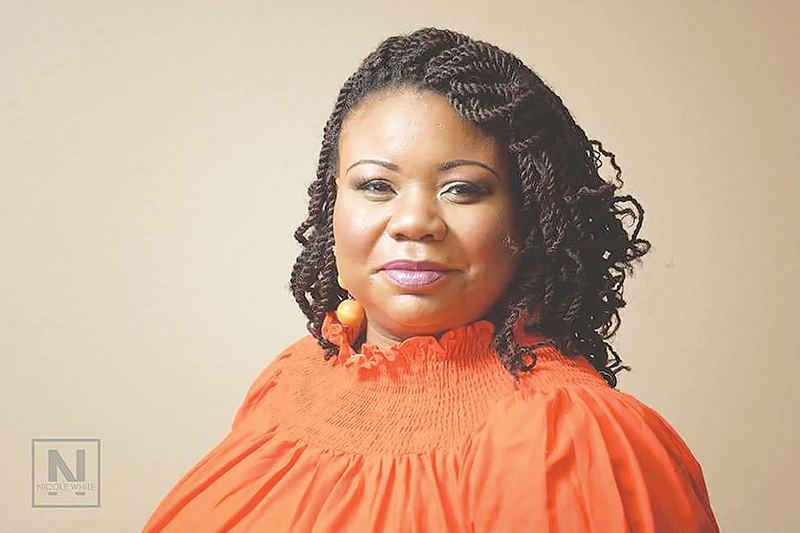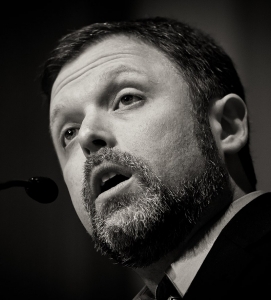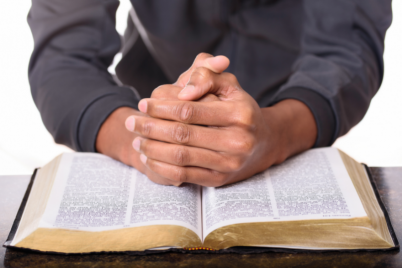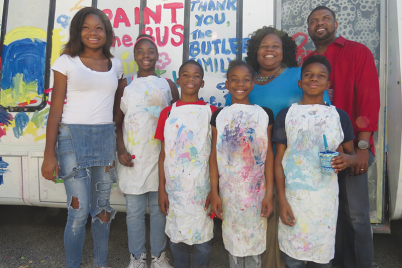Dr. LaDonna Butler held her annual mental health summit virtually on July 31 and Aug. 1.
BY KARIN DAVIS-THOMPSON, Staff Writer
ST. PETERSBURG — When COVID-19 forced communities, schools, and businesses to shut down, Dr. LaDonna Butler worried about what it would mean for her organization’s annual Healing While Black (Mental Health) Summit. She knew the summit was necessary and decided the best thing was to go virtual.
She worked the plan, got the sponsors, set up registration and hoped for the best. It turned out better than she ever could have imagined, with the largest number of registrants in the event’s three-year history.
“We had 1,075 people register for the summit with at least 232 people online during any session,” Butler said.
The summit is held each year in July, which was once known as National Minority Mental Health Month, but this year became National Black Indigenous People of Color (BIPOC) Month. The purpose is to provide a safe space for attendees to discuss their experience, explore research and acknowledge the need for healing.
“I can’t underestimate the importance of the healing process. It involves three important steps: recognizing, reclaiming, and restoring healthy well-being,” said Butler, who is also the founder of The Well for Life and New Vision of the Well.
Both are organizations formed to provide training, alliance building, and advocacy around mental health and well-being to the community.
The event began with a virtual pre-summit stretch and various breakout sessions for attendees to participate in topics ranging from using the arts to express the need for healing to how public policy plays a role.
The summit, hosted by The Well for Life, in partnership with the University of South Florida and the Pinellas County Urban League, took place during the last weekend in July and concluded with the “Brown Girl’s Brunch,” a virtual event for women to discuss healing and the struggles and strengths it takes to feel better, as well as “Live at the Grill,” a session for men to discuss their own mental health and the challenges that come with admitting to mental health struggles.
Butler, a licensed mental health counselor and an adjunct professor at USF, said she was humbled by the turnout, with people tuning in from California and as far away as the United Kingdom.
“We are now looking at how we can incorporate virtual next year as well as in-person,” she said.
The wife and mother of five went on to say that while the summit may be over for another year, there is still work to be done.
She said she is currently looking for volunteers to help continue the momentum from the summit and help her organization work on ways to make sure attendees remain connected and have a safe space to continue healing.
“That’s more than 1,000 people we need to keep connected, who are interested in the work,” Butler said, referring to the number of attendees. “We now need to create an ongoing community of support and a network of national professionals, developing a place for Black people to be able to heal collectively. That is what I am excited about.”
‘Healing & Justice in Unjust Times’
BY FRANK DROUZAS, Staff Writer
Activist and writer Tim Wise spoke at the Healing While Black virtual summit, delivering his talk “Not Giving Up: Maintaining Our Commitment to Healing & Justice in Unjust Times.”
For people wondering how to maintain hope amid injustice and inequity, Wise pointed out the difference between hope and commitment, explaining that hope is a very passive thing, while commitment is active.
“It takes on actionable qualities,” he said. “A commitment is about what you are going to do…when we have been traumatized as people, whether that’s a racialized trauma for Black and Brown folk or any other kind of trauma that people experience, you have to take an active role in your healing.”
If you are a person of color in this country, you have very little choice but to maintain commitment because if you don’t, “you go under,” Wise said. But in practical terms, there is a choice. When you’re traumatized, he said, when you are systemically marginalized, it can be incredibly taxing and tiring to get up yet again and fight the fight.
“Sometimes, it’s easier to just keep your head down and go about your business and try to survive, but not necessarily thrive,” Wise said.
Sadly, many folks, when they’re marginalized, do “check out” from the struggle because they either don’t have the energy or the sense that anything is truly going to change. In turn, they give up not just hope but the commitment.
These days, there is certainly much to be discouraged about, he said, like the massive death toll COVID-19 has taken on Americans and the fact that Black and Brown people are 2.5-3 times more likely to have died from this virus per capita. The “authoritarian crackdown” of peaceful demonstrations we have seen in cities like Portland, Ore., and others is another reason for despondency these days — namely, since over 850 videos have surfaced of police brutalizing protestors around the country.
“We’re not talking about so-called rioters, we’re not talking about so-called looters, we’re not talking about people that are engaged in any kind of destruction,” Wise said, drawing an important distinction. “We’re talking about peaceful demonstrators.”
He underscored that we could certainly become despondent over the long-standing inequalities, not just the recent ones that predate by years and even centuries the administration of Donald Trump. These inequities will be around long after this president unless we do something, he said.
“Inequities in wealth, inequities in income, inequities in health, inequities in education, inequities in the criminal justice system. These are not the creation of one political party,” he said, “they are not the creations of this modern era. They’re long-standing intergenerational systemic problems.”
Wise asserted that if the coronavirus had been disproportionately affecting white people rather than black and brown people, then much more would have been done.
“If this illness had been disproportionately killing white folks, especially white folks with a little bit of money, especially white folks that were in the prime of their lives, especially white folks who were healthy generally as opposed to those who have pre-existing conditions…we would have shut everything down, and nobody would be talking about opening back up!”
Yet because this pandemic is disproportionately hitting Black and Brown people, it’s acceptable for white people with guns to invade state capitols and demand freedom from the “authoritarian” stance of keeping the economy closed. Their view, Wise said, is this: ‘We have to open back up, it’s freedom! My liberty is being taken from me!’
“No, liberty is what George Floyd had taken from him,” he said. It’s what Breonna Taylor had taken from her. It’s what Ahmaud Arbery had taken from him. It’s not being told to stand six feet away from somebody at Trader Joe’s. That’s not authoritarianism.”
In the midst of all this, there’s still reason to maintain commitment and opportunity in this moment, Wise said. This window of opportunity is afforded because of young protestors doing the hard work daily on American streets, the same work Rep. John Lewis and others like him did 60 years ago.
“We see right now the largest racial justice uprising in the history of the country,” Wise noted.
There are millions of white people in the streets as well, chanting the phrase, “Black Lives Matter!” as they have not been merely embracing the slogan but what is behind the slogan. Yet as these whites may have been awakened to all this injustice this year, their temptation to “hit the snooze button” can be very strong, historically speaking.
Though the murder of Floyd may have produced this cumulative effect we’re witnessing these days, Wise said he is hoping that this outrage is something bigger than that.
One conversation that has grown in leaps and bounds in the past few months is the feasibility of taking money from law enforcement and instead putting into trauma care, mental health, education and domestic violence services.
“That conversation six months ago? You couldn’t get any traction on that,” he said, “unless you were already working with people involved in racial justice.”
Another talking point that has been given more attention, as a result, is the paying of reparations, as more people recognize it as a legitimate conversation worth holding. This and other cries to right the racial wrongs have been going on for some time in this country, so what is different this time?
“For the first time, you have millions of white people who are actually having to ask themselves the kind of questions about our safety that Black folks always ask and that brown folks always ask,” Wise pointed out. “Questions like, ‘Is it safe to go shopping? Is it safe to go to the grocery? Is it safe to go to the park? Is it safe to go for a walk or a jog around my neighborhood?’ Now for Black folks, those are not pandemic questions…Is it safe to go for a jog around the neighborhood? You could ask Ahmaud Arbery, but you can’t, and we all know why.”
When you suddenly find yourself vulnerable, as many whites do these days, it creates an opening for empathy, Wise opined.
Wise also cited law professor Derrick Bell’s practical interest convergence theory, where historically, white people have pushed for civil rights for Black people only when it suited the needs of both groups. Then how does interest convergence play out these days?
Imagine white people who have a genuine fear of the coronavirus, Wise said, watching on television as armed groups storm state capitols, calling the pandemic a hoax and demanding everything to go back to normal.
“Some white people might say of these folks, ‘They’re wanting to roll the dice not just on Black folks’ lives, which I might not have cared about historically, not just on brown folks’ lives — as they lock those children up at the border in cages — which I didn’t really care about — they’re willing to roll the dice on my grandma! They’re willing to roll the dice on my immuno-suppressed child! They don’t love me either! I’m starting to think they’re not on my team. Maybe I’m on the team that the Black folks in the streets are on, talking about the need for guaranteed health care, talking about the need for public health as a right!’”
The need to take care of the community as a whole becomes key, so white people then wonder about the mentality that’s been cultivated for centuries, which says that there is a hierarchy of human value based on factors such as health, age, color, and wealth.
“When you create a hierarchy of human worth that says some people are worth more than other people,” Wise said, “what ends up happening is, you may think it’s only going to affect those people on the other side of town, but it’s going to come back and bite you.”
Wise pointed out that if enough white people join in solidarity with Black and Brown leaders of this struggle, we can all begin to make actual change in this country.
“We have the capacity for that,” he said, “if we maintain our commitment, as we must.”
To learn more about The Well for Life or to volunteer, visit www.thewellforlife.org.










